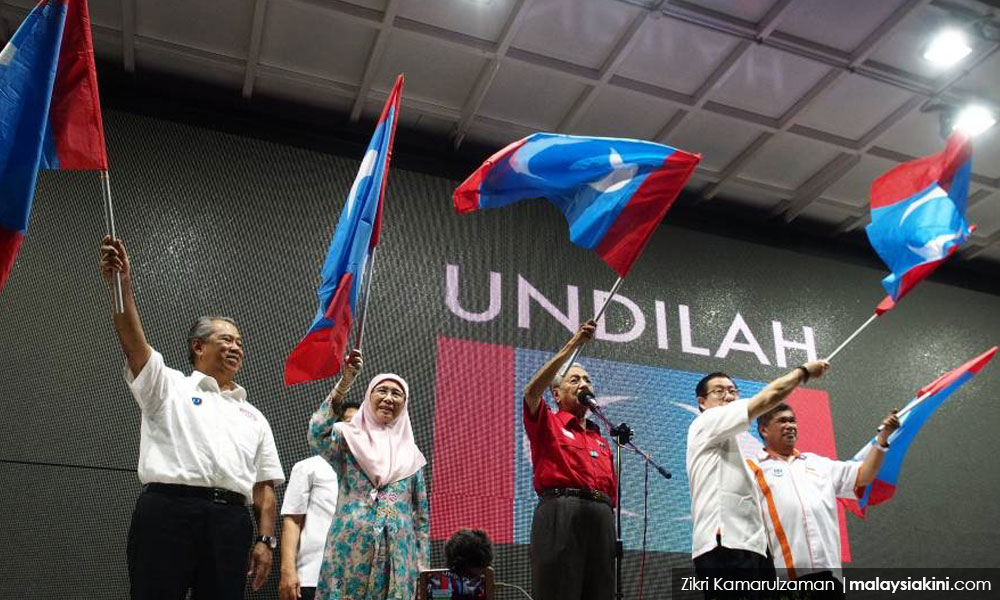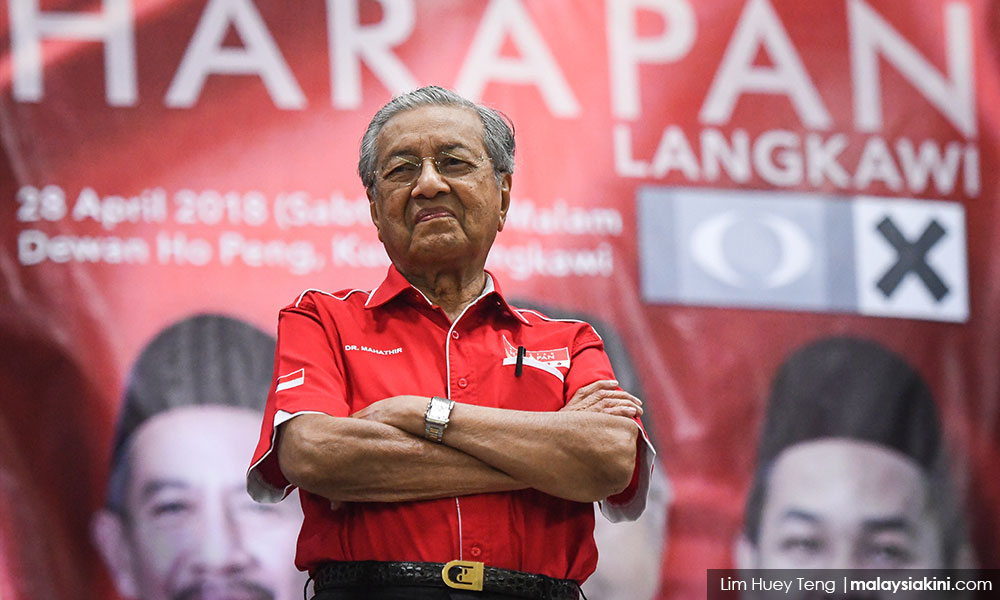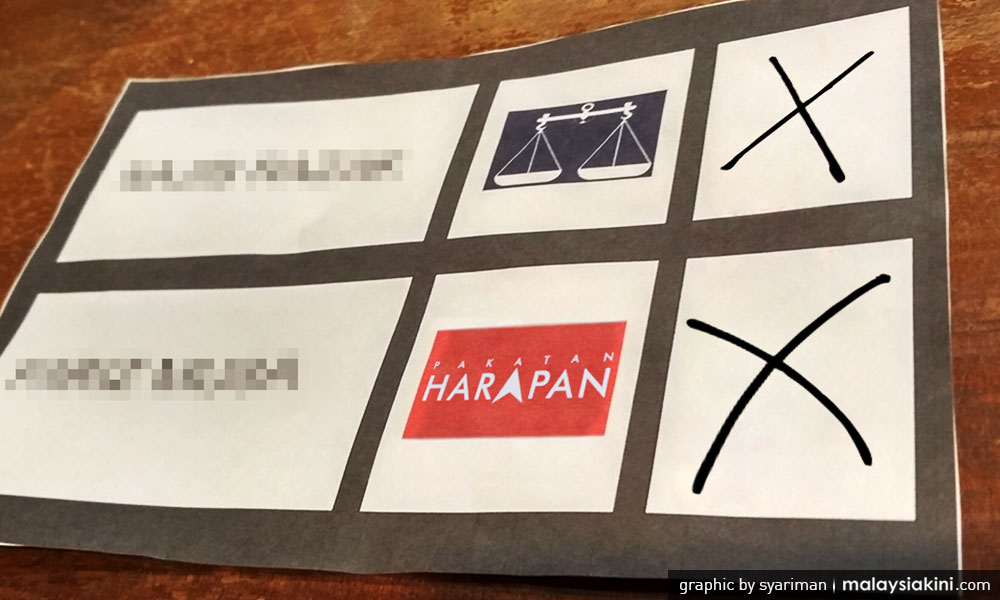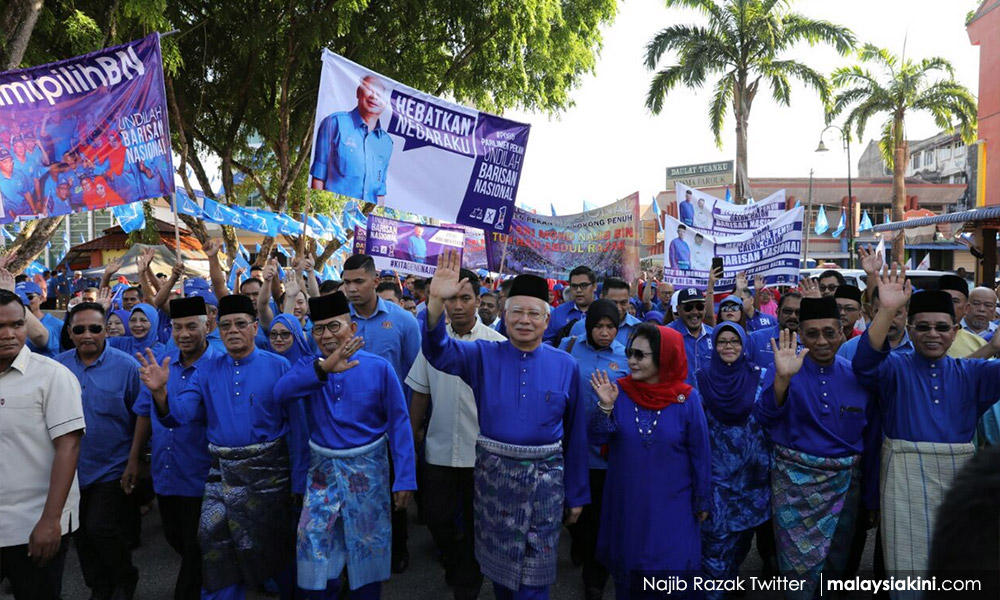
In an earlier article, I estimated the chances of an opposition victory at no more than 10 percent as a result of the recent electoral gerrymandering and voter malapportionment exercise.
When the factors of machinery, media and money are taken into account with the combination of a BN-controlled civil service and array of anti-opposition actions and measures put in place by the Electoral Commission and other government agencies to influence the outcome of previous election battles, the forecast did not appear unduly pessimistic.
Since then as we enter into the final lap of the election battle, the odds for an upset Pakatan Harapan victory have shortened, if one goes by crowd size and response to BN and Harapan rallies seen in social media messages inundating my email, Facebook and WhatsApp accounts.
This development may be a misleading indicator. But there is no mistaking the contrast between the enthusiastic and large audiences attending Harapan rallies, and the small and passive groups gathered at BN ones.
It could be that the purveyors of these social media snippets are Harapan supporters. However, the images are all too real. They have not been doctored and there does not appear to be any fake news intention.
A second wind?
What may be happening is that the Harapan opposition has found a second wind going into the last two weeks of GE14 – the critical and decisive stage.
This second wind is coming not just from Harapan chairperson Dr Mahathir Mohamad, whom many see as the possible game-changer for the opposition. It is coming from diehard supporters of Harapan using the internet and social media as their channel and voice for political change.

Earlier this year, the political social media research organisation, Politweet, in its report on “Election Forecast for Pakatan Harapan in Peninsular Malaysia" argued that the low interest in political parties among the younger generation would make it harder for Harapan to spread their message through social media.
This conclusion was reached through analysis of voter interest in political parties, as reflected in Facebook Malaysia between 2014 and 2018.
According to its calculation based on profile information, page likes, posts, shares and other activity, voter political interest among Facebook users had risen from 44.8 percent in April 2014 to a peak of 63.6 percent in December 2015. Since then it had fallen to a low of 29.5 percent by December 2017.
This trend of declining or fatigued and saturated political interest has also been noted by other observers, especially those following the comments of readers on online news portals.
But is it true that the younger generation has lost interest in the political affairs and future of the country? Or that it is harder for the opposition to spread their message through social media?
BN not taking chances
Analysts may see the UndiRosak movement and the enactment of the Anti-Fake News Act 2018 as further evidence that a social media constrained by new controls and youth disinterest may prove stumbling blocks to a stronger opposition performance in the election.

However, strategists working to ensure a BN victory clearly are not taking chances on this postulation. Besides inundating the landscape with buntings and flags, the ruling party has given unprecedented emphasis to its digital election campaign, which is estimated by media professionals to be running into the millions of ringgit.
According to the Centre to Combat Corruption and Cronyism (C4), no less than ten high-profile websites in the country have been targeted to carry digital advertisements in support of the ruling government. At the same time, there has been a sharp rise in the number of sponsored bots flooding Twitter with anti-opposition and pro-government messages.
Machinery, media and money - besides electoral chicanery and dirty tricks - may yet produce another BN victory.
But it could also be that as with the unexpected victories of Brexit in the UK referendum and Donald Trump in the 2016 US presidential election, the campaign run by supporters of Harapan - which is much poorer, less professionally run but more grassroots-oriented, more motivated by idealism – may strike a deeper chord with a sizable proportion of fence-sitters and undecided voters.
Comparing BN and Harapan campaigns
The contrast between the ruling BN and opposition Harapan campaigns could not be more different.
One is of a well-organised, lavishly-endowed, smug, incumbent super political power steamrolling over whatever opposition there is out there.
Slick and soothing messages fill the airwaves and print media from the BN manifesto reassuring that the country will rise to greater heights under the BN; that there’s a place in the sun for all Malaysians; promising better lives and millions of jobs from the 14 thrusts and 300 initiatives directed at every segment of Malaysian society.
Against it is a handicapped, impoverished and disorganised sub-power able to finally get its act together of late, mainly because Mahathir, the oldest active political leader in the country, decided to take on caretaker prime minister Najib Abdul Razak over the 1MDB scandal.

Aside from Mahathir’s intervention, the message from the opposition side – as one would expect – is short on promises and details on the country’s future, should it come to power. Just 10 promises in the first 100 days, according to the Harapan manifesto.
What’s fuelling the late opposition challenge is not the comprehensiveness, consistency or practicality of its manifesto.
It is the palpable sense of loss of faith, outrage and revulsion expressed through the internet with the BN’s record of mismanagement, self-aggrandisement for its leaders, and politically abusive rule which has sent the country sliding backwards as a progressive and inclusive nation where its citizens can walk tall.
In 2009, the former British prime minister, David Cameron, described the internet as an “amazing pollinator” that “turns lonely fights into mass campaigns; transforms moans into movements; excites the attention of hundreds, thousands, millions of people and stirs them to action.”
May 9 will see whether this amazing pollinator can deal a knockout blow to BN.
LIM TECK GHEE is a retired academician and is currently a public policy analyst. - Mkini



No comments:
Post a Comment
Note: Only a member of this blog may post a comment.